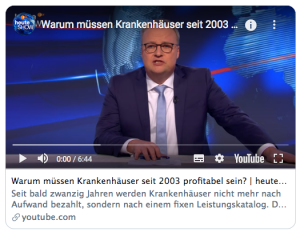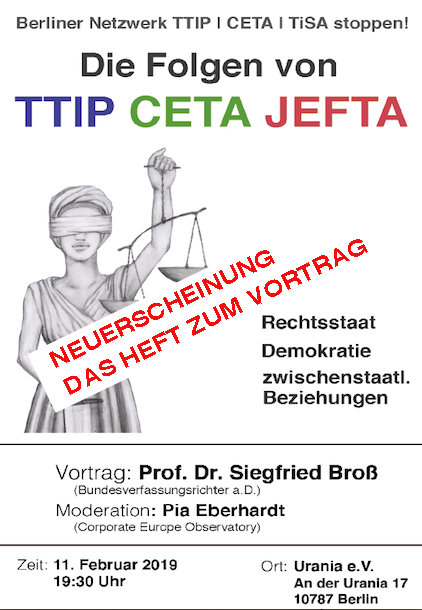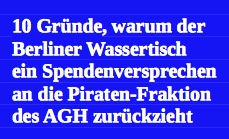Tagesschau.de
13.08.2014 19:30
Freihandelsabkommen mit Kanada. Auf dem Weg in die Paralleljustiz
Von Tamara Anthony, ARD-Hauptstadtstudio
Im Schatten des Freihandelsabkommens TTIP zwischen der EU und den USA steht eine ähnliche Vereinbarung mit Kanada vor dem Abschluss – CETA. Der Vertragstext zeigt: Auch dieses Abkommen könnte Regierungen den Klagen privater Investoren aussetzen.
Von Tamara Anthony, ARD-Hauptstadtstudio
Zum Beitrag
Der Vertrag als pdf
Ein erster Kommentar von Public Citizen’s Global Trade Watch zum Leak:
The leaked CETA text’s investor-state provisions are expectedly bad.
Beyond the obvious fact that CETA includes ISDS, most specific CETA investor-state terms are nearly identical to the unacceptable provisions in the draft CETA text that the Commission provided as reference for the ISDS consultation process. The criticisms of that draft text can thus largely serve as an indictment of the leaked CETA text’s ISDS terms. As an example, see the thorough critique by the Trans Atlantic Consumer Dialogue: https://tacd.org/wp-content/uploads/2014/07/TACD-Response-to-EU-Consultation-on-ISDS-FINAL-2.pdf.
The leaked CETA text includes:· Investor-state dispute settlement, with weak tweaks around the margins. As many of the 150,000 comments submitted in response to the ISDS consultation made clear, ISDS cannot be “fixed” and must be ditched. CETA includes an expansion of ISDS, with marginal tweaks that would not address the core problems associated with empowering foreign firms to circumvent domestic courts and challenge public interest policies before extrajudicial tribunals. And even those tweaks are weak. For example, some have argued that creating an appeals mechanism would, while not solving the problems of ISDS, be an iterative improvement in reining in the unchecked discretion of tribunals. But rather than create an appeals mechanism, or even require the future creation of such a mechanism, the CETA text merely tasks a Committee with creating a “forum” for the EU and Canada to “consult” on “whether, and if so, under what conditions, an appellate mechanism could be created.”
· An expansive definition of “fair and equitable treatment.” This is the widely used and abused investor “right” that has served as the basis for many of the foreign investor “wins” against public interest policies, thanks to tribunals’ inventive interpretations of States’ obligations under the vague terms. The CETA definition of “fair and equitable treatment” would explicitly empower tribunals to use one of their more expansive interpretations, by stating that tribunalists may consider whether a challenged domestic policy frustrated the investor’s “legitimate expectation” when deciding whether to order taxpayer compensation.
· Rules on expropriation that exceed domestic law in many countries. Under the CETA provisions, States could be obliged to compensate foreign investors for regulatory actions that would not be subject to compensation for expropriation claims under domestic law. While the annex clarifying the meaning of expropriation may help deter the most far-fetched claims against domestic policies or actions, it still would allow for a broad definition of indirect expropriation that invites tribunal decisions against regulatory policies on the mere basis that they adversely affected the value of an investment.
· A broad definition of investment that would extend the deal’s substantive investor protections to activities and instruments that would not be provided the same protections in domestic law. The CETA definition of an investment includes vague concepts such as “assumption of risk” and “expectation of gain or profit,” which would grant tribunals wide discretion in determining whether an actionable investment exists, and thus, whether an investor-state challenge to domestic policies could proceed.
· A ban on capital controls and financial transaction taxes. A CETA provision requiring unrestricted transfers would act as a ban on capital controls, which the International Monetary Fund and many mainstream economists have endorsed as legitimate policy tools for mitigating or preventing financial crises. The CETA language also conflicts with financial transaction taxes, which 11 EU member nations are slated to implement. While the CETA exceptions chapter offers some narrow limitations on this anachronistic ban on capital controls, though they would not provide a sufficient safeguard, and they would do nothing to protect a State’s prerogative to enact financial transaction taxes.
Again, none of this is particularly surprising for those who have followed the CETA negotiations or who saw the draft CETA text as part of the consultation process. But lack of surprise makes it no less deserving of outcry.
Ben Beachy, Research Director
Public Citizen’s Global Trade Watch
215 Pennsylvania Ave., SE
Washington, DC 20003, USA
Phone: 202-454-5127
Blog: www.EyesOnTrade.org
Twitter: @pcgtw



















 Pressemitteilungen
Pressemitteilungen








